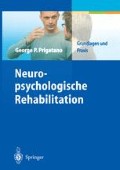Zusammenfassung
8. Prinzip: Der Umgang mit Hirngeschädigten löst im familiären Umfeld und im Rehabilitationsteam bestimmte emotionale Reaktionen aus. Das angemessene Management dieser Reaktionen ist von entscheidender Bedeutung für den Rehabilitations-und Adaptationsprozess.
„In einem kürzlich erschienenen Artikel der Zeitschrift „Archives“lenkte Dr. John Melville unsere Aufmerksamkeit auf die Unterschiede zwischen multidiszipllnären und interdisziplinären Ansätzen, die folgendermaßen zusammengefasst werden können: Beide erfordern die Beteiligung von Menschen aus unterschiedlichen Disziplinen und eine zumindest allgemeine Vertrautheit mit dem Wissen und den Methoden der anderen Disziplinen. Interdisziplinarität unterscheidet sich von Multidisziplinarität dahingehend, dass ihr Erfolg von der engen, interaktiven Zusammenarbeit aller involvierten Disziplinen abhängt. In Melvilles Worten: > Das Produkt ist mehr als die summe seiner Teile<” (Fordyce 1981, S. 51).
Access this chapter
Tax calculation will be finalised at checkout
Purchases are for personal use only
Preview
Unable to display preview. Download preview PDF.
Literatur
Ben-Yishay, Y., und Prigatano, G. P. (1990). Cognitive remediation. In E. Griffith, M. Rosenthal, M. R. Bond, und J. D. Miller (eds), Rehabilitation of the Adult and Child with Traumatic Brain Injury (pp.393-409). F. W. Davis, Philadelphia.
Chamberlain, K., und Zika, S. (1990). The minor events approach to stress: support for the use of daily hassles. Br. J. Psychol. 81:469–481.
Fordyce, W.E. (1981). ACRM Presidential Address on Interdisciplinary Peers. Arch. Phys. Med. Rehabil. 62:S1–S3.
Franzen, E.A., und Meyers, R. E. (1973). Neural control of social behavior: prefrontal and anterior temporal cortex. Neuropsychologia 11: 141–157.
Gabbard, G. O. (1990). The therapeutic relationship in psychiatric hospital treatment. Bull. Menninger Clin. 56(1):4–19.
Gans, J. S. (1983). Hate in the rehabilitation setting. Arch. Phys. Med. Rehabil. 64: 176–179.
Haney, C, Banks, C, und Zimbardo, P. (1973). Interpersonal dynamics in a simulated prison. International Journal of Criminology and Penology 1:69–97.
Holmes, T., und Rahe, R. (1967). The social readjustment rating scale. J. Psychosomatic Research 11:213–218.
Isaac, G., und Leakey, R. E. F. (1979). Introduction. In G. Isaac und R. E. F. Leakey (eds), (pp. 2-8) Readings from Scientific American, Human Ancestors. W. H. Freeman, San Francisco.
Macciocchi, S.N., und Eaton B.(1995). Decision and attribution bias in neurorehabilitation. Arch. Phys. Med. Rehabil. 76:521–524.
Maslach, C (1982). Burnout-The Cost of Caring. Prentice Hall, New York.
Myers, I. B., und McCaulley, M. H. (1989). Manual: A Guide to the Development and Use of the Myers-Briggs Type Indicator. Consulting Psychologist, Palo Alto, Calif.
Prigatano, G. P. (1989). Bring it up in milieu: toward effective traumatic brain injury rehabilitation interaction. Rehabilitation Psychology 34(2): 135–144.
Prigatano, G. P. (1992). What does the brain injured person experience? Implications for rehabilitation. Centennial Lecture in Brain Injury Rehabilitation, American Psychological Association Convention, Washington, D.C.
Prigatano, G. P., Fordyce, D.J., Zeiner, H. K., Roueche, J. R., Pepping, M., und Wood, B. (1984). Neuropsychological rehabilitation after closed head injury in young adults. J. Neurol. Neurosurg. Psychiatry 47:505–513.
Prigatano, G. P., Klonoff, P.S., O’Brien, K. P. et al. (1994). Productivity after neuropsychologically oriented, milieu rehabilitation. Journal of Head Trauma Rehabilitation 9(1): 91–102.
Prigatano, G. P., und Schacter, D. L.(1991). Awareness of Deficit after Brain Injury: Theoretical and Clinical Issues. Oxford University Press, New York.
Prigatano, G. P., Wong, J.L., Williams, C. und Plenge, K. (1997). Prescribed versus actual length of stay and inpatient neurorehabilitation outcome for brain dysfunctional patients. Arch. Phys. Med. Rehabil. 78:621–629.
Prigatano, G. P., et al. (1986). Neuropsychological Rehabilitation After Brain Injury. Johns Hopkins University, Baltimore.
Washburn, S.(1960). Tools and human evolution. In G. Isaac und R. E. F. Leakey (eds), Readings from Scientific American. Human Ancestors (pp. 1-21). W. H. Freeman, San Francisco.
Zika, S., und Chamberlain, K. (1987). Relation of hassles and personality to subjective well-being. J. Pers. Soc. Psychol. 53(1): 55–162.
Zika, S., und Chamberlain, K. (1992). On the relation between meaning in life and psychological well-being. Br. J. Psychol. 83: 133–145.
Zimbardo, P. G., Haney, C., Banks, W.C, und Jaffe, D. (1973). The mind is a formidable jailer: a Pirandellian prison. New York Times Magazine April 8:38–60.
Author information
Authors and Affiliations
Rights and permissions
Copyright information
© 2004 Springer-Verlag Berlin Heidelberg
About this chapter
Cite this chapter
Prigatano, G.P. (2004). Zusammenarbeit in interdisziplinären Rehabilitationsteams. In: Neuropsychologische Rehabilitation. Springer, Berlin, Heidelberg. https://doi.org/10.1007/978-3-642-18768-1_10
Download citation
DOI: https://doi.org/10.1007/978-3-642-18768-1_10
Publisher Name: Springer, Berlin, Heidelberg
Print ISBN: 978-3-540-43653-9
Online ISBN: 978-3-642-18768-1
eBook Packages: Springer Book Archive

